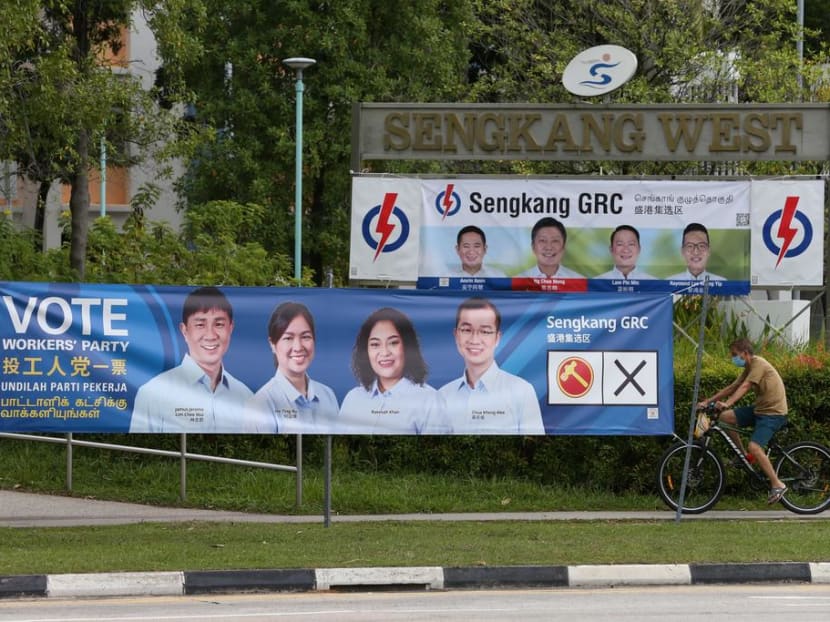IPS post-GE2020 forum: 'Encouraging’ rise in political engagement, parties urged to modernise campaigns
SINGAPORE — Young people’s use of Instagram to educate and mobilise one another during the 2020 General Election (GE) was a heartening development that bodes well for the electorate, experts at an Institute of Policy Studies (IPS) forum said. They added that political parties should harness more modern data analytics to study voter trends.

Political parties in Singapore still seemed to cling to traditional campaigning methods and failed to spot signals given by voters through their interactions online, a study found.
- Researchers were “heartened” to see young people use Instagram to educate others on the elections
- Active discussion of issues online can help break down opinion silos, they said
- Political parties, however, are still lacking in how they harness social media data
SINGAPORE — Young people’s use of Instagram to educate and mobilise one another during the 2020 General Election (GE) was a heartening development that bodes well for electorate, experts at an Institute of Policy Studies (IPS) forum said. They added that political parties should harness more modern data analytics to study voter trends.
Campaigning for the July 10 GE, held during the Covid-19 pandemic, was conducted mainly online. Unable to hold physical mass rallies, political parties turned to livestreams, webinars and high-budget video productions.
Younger voters, too, turned to social media platforms to share information about the election.
Dr Carol Soon, head of the society and culture department at IPS, said: “Most of us who were studying the election really felt quite heartened by the kind of engagement we saw on Instagram.”
Yet, political parties here still seemed to cling to traditional campaigning methods and failed to spot signals given by voters through their interactions online.
Mr Chua Chin Hon, chief data analyst at Analytix Labs, said: “Some parties are probably trapped in a false choice of sorts, in trying to decide whether to go to what they’re familiar with versus (analysing) what’s coming up on the social media data.
“Frankly you don’t need to choose between the two.”
The experts were speaking on Thursday (Oct 8) after the release of research findings about media and internet consumption during GE2020.
The findings were based on a survey of some 2,000 citizens from July 13 to 21 commissioned by IPS to look at the link between media use and political traits, participation and voting behaviour.
At the forum, Mr Chua also presented an analysis of social media data collected by his artificial intelligence services firm.
INCREASED ONLINE ENGAGEMENT
The IPS study found that more voters — including older ones — expressed opinions and shared political information on social media in this GE compared to GE2015.
“That, to me, is encouraging,” Dr Natalie Pang, senior lecturer at the National University of Singapore’s communications and new media department, said. She was one of the researchers for the IPS study.
Dr Pang added that it is important for citizens to discuss issues on social media, especially issues that draw polarising opinions.
She told TODAY: “With issues that are polarising, quite often we would find that opinion leaders on both sides of these issues would express their opinions, and people who come across these opinions can be persuaded or coalesce around them in opinion silos.
“But when there is greater expression across the spectrum of citizens, we can moderate the polarisation a bit more as users would be more exposed to cross-cutting views.”
MODERNISING CAMPAIGN STRATEGIES
At the forum, Mr Chua presented his analysis of the number of likes, shares, comments and reactions of more than 8,000 GE-related posts from 15 Facebook pages.
While political parties are getting better at producing social media content, he noted that they mostly adopted a “fire-and-forget” attitude, using these platforms merely as distribution channels and not studying how users were interacting with social media posts on different topics.
“What I hope that they will do more of in future GEs is really bring a lot more of the modern analytics tools and skill sets into the campaigning here and I think that would reduce the number of surprises that pop up,” the former journalist said.
Some of these “surprises” that could have been spotted if parties paid more attention were: The overall swing towards the Opposition in GE2020 and that voters were not resonating as strongly with the People’s Action Party’s core message on securing jobs.
He cautioned, however, that Facebook analytics data is only a limited proxy for voters’ sentiment.
“Facebook interaction data is very noisy, it does not connect directly to actual voting behaviour, so you can only make inferences about it,” Mr Chua said, adding that certain trends become clearer when analysis is done with the benefit of hindsight.
“The art of political analysis is still needed in terms of how you interpret that data and how you interpret that sentiment,” he said. “Social media data or Facebook data is just one piece of the very complex puzzle that political parties need to look at when it comes to elections and is by no means the only one.”











